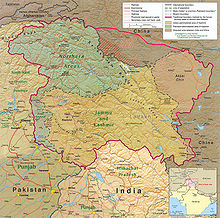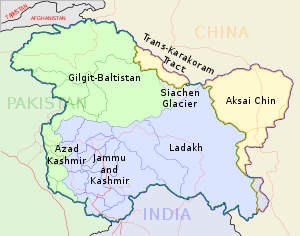Jammu and Kashmir (state) - Simple English Wikipedia, the free encyclopedia
| Jammu and Kashmir | |||||||||||
|---|---|---|---|---|---|---|---|---|---|---|---|
| Former state[broken anchor] | |||||||||||
| 1954–2019 | |||||||||||
 Map of Jammu and Kashmir | |||||||||||
| Capital | Srinagar (May-October) Jammu (November-April)[1] | ||||||||||
| Area | |||||||||||
| • Coordinates | 33°27′N 76°14′E / 33.45°N 76.24°E | ||||||||||
| History | |||||||||||
| Government | |||||||||||
| Governor | |||||||||||
• 1954–1965 as Sadr-e-Riyasat; 1965–1967 | Karan Singh (first) | ||||||||||
• 2018–2019[2] | Satya Pal Malik (last) | ||||||||||
| Chief Minister | |||||||||||
• 1947–1948 as Prime Minister | Mehr Chand Mahajan (first) | ||||||||||
• 2016–2018[3] | Mehbooba Mufti (last) | ||||||||||
| Legislature | Jammu and Kashmir Legislature | ||||||||||
• Upper house | Jammu and Kashmir Legislative Council (36 seats) | ||||||||||
• Lower house | Jammu and Kashmir Legislative Assembly (89 seats) | ||||||||||
| History | |||||||||||
• Presidential order of 1954 comes into force, established as state of India | 14 May 1954 | ||||||||||
| 31 October 2019 | |||||||||||
| Political subdivisions | 22 districts | ||||||||||
| |||||||||||
Jammu and Kashmir was the northmost state of India. The state covered 138,200 square miles (357,936.4 km2) and is mostly in the Himalayan mountains. Jammu and Kashmir used to be a British protectorate in 1860. Jammu and Kashmir borderd the states of Himachal Pradesh and Punjab to the south-east and south respectively. The other parts of state are administered by Pakistan as Azad Jammu and Kashmir and Gilgit-Baltistan.
Jammu and Kashmir has been a subject of dispute between India and Pakistan since 1947, and China since 1962.
Demographics
[change | change source]
Jammu and Kashmir has a Muslim majority population. Though Islam is practiced by about 88% of the population of the state and by 97% of the population of the Kashmir Valley,[4] the state has large communities of Sikhs, Hindus (inclusive of Meghwal).[5]
Jammu and Kashmir consisted of three divisions: Jammu region, Kashmir Valley, and the Ladakh region. Srinagar is the summer capital, and Jammu its winter capital. The Kashmir valley, often called paradise on Earth,[6] is famous for its beautiful mountainous landscape. Jammu's numerous holy shrines attracts millions of Hindu pilgrims every year from all over the India. Ladakh, also known as "Little Tibet", is renowned for its remote mountain beauty and Buddhist culture.
References
[change | change source]- ↑ Desk, The Hindu Net (8 May 2017). "What is the Darbar Move in J&K all about?". The Hindu. Archived from the original on 10 November 2017. Retrieved 23 February 2019.
{{cite news}}:|last=has generic name (help) - ↑ "Satya Pal Malik sworn in as Jammu and Kashmir governor". The Economic Times. Press Trust of India. 23 August 2018. Archived from the original on 23 August 2018. Retrieved 31 August 2018.
- ↑ "BJP-PDP alliance ends in Jammu and Kashmir LIVE updates: Mehbooba Mufti resigns as chief minister; Governor's Rule in state". Firstpost. 19 June 2018. Retrieved 19 June 2018.
- ↑ Calculated from the 2001 Census India District Profiles
- ↑ 2001 Census India: Data by Religious Communities
- ↑ "Paradise on Earth - October 4, 2007 - The New York Sun". Archived from the original on October 9, 2007. Retrieved June 13, 2008.
Other websites
[change | change source]- Jammu and Kashmir (state) at the Open Directory Project
- Government of Jammu and Kashmir, India Archived 2017-09-15 at the Wayback Machine


 French
French Deutsch
Deutsch
